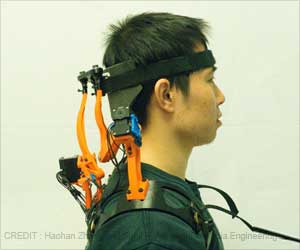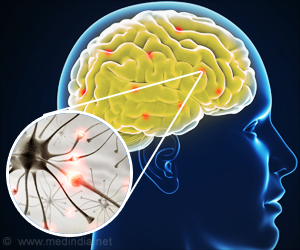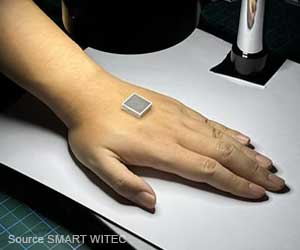Newly developed robotic neck brace can dramatically improve functions of Amyotrophic Lateral Sclerosis (ALS) patients, reveals a new study.

TOP INSIGHT
New robotic neck brace that supports the neck during its natural motion can dramatically improve functions of Amyotrophic Lateral Sclerosis (ALS) patients.
Read More..
The brace also shows promise for clinical use beyond ALS, according to Agrawal, who directs the Robotics and Rehabilitation (ROAR) Laboratory. "The brace would also be useful to modulate rehabilitation for those who have suffered whiplash neck injuries from car accidents or have from poor neck control because of neurological diseases such as cerebral palsy," he said.
"To the best of my knowledge, Professor Agrawal and his team have investigated, for the first time, the muscle mechanisms in the neck muscles of patients with ALS. Their neck brace is such an important step in helping patients with ALS, a devastating and rapidly progressive terminal disease," said Hiroshi Mitsumoto, Wesley J. Howe Professor of neurology at the Eleanor and Lou Gehrig ALS Center at Columbia University Irving Medical Center who, along with Jinsy Andrews, assistant professor of neurology, co-led the study with Agrawal.
"We have two medications that have been approved, but they only modestly slow down disease progression. Although we cannot cure the disease at this time, we can improve the patient's quality of life by easing the difficult symptoms with the robotic neck brace."
Commonly known as Lou Gehrig's disease, ALS is a neurodegenerative disease characterized by progressive loss of muscle functions, leading to paralysis of the limbs and respiratory failure. Dropped head, due to declining neck muscle strength, is a defining feature of the disease. Over the course of their illness, which can range from several months to more than 10 years, patients completely lose mobility of the head, settling in to a chin-on-chest posture that impairs speech, breathing, and swallowing. Current static neck braces become increasingly uncomfortable and ineffective as the disease progresses.
"In the next phase of our research, we will characterize how active assistance from the neck brace will impact ALS subjects with severe head drop to perform activities of daily life," said Agrawal, who is also a member of Columbia University's Data Science Institute. "For example, they can use their eyes as a joystick to move the head-neck to look at loved ones or objects around them."
 MEDINDIA
MEDINDIA




 Email
Email






